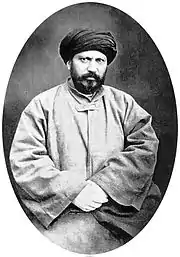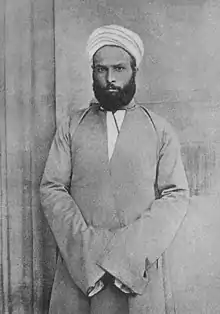Al-Urwah al-Wuthqa
Al-Urwah al-Wuthqa (Arabic: العروة الوثقى, The Firmest Bond) was an Islamic revolutionary journal founded by Muhammad Abduh and Jamāl al-Dīn al-Afghānī.[1][2] Despite only running from March 13, 1884 to October 1884, it was one of the first and most important publications of the Nahda. It was directed toward the Islamic Ummah, and called upon it to unite.[3] It also took a firm stance against European colonialism, and it was banned by British authorities in Egypt and India.[4]
 | |
| Editor | Jamāl al-Dīn al-Afghānī and Muhammad Abduh |
|---|---|
| Categories | literary, political |
| First issue | March 13, 1884 |
| Final issue | October 1884 |
| Language | Arabic |
Name
Al-Urwah al-Wuthqa is an Arabic term with religious significance, appearing twice in the Quran.
First publication


It was started in a room in Paris, and the first edition was published on March 13, 1884, corresponding with 15 Jumādā al-Ūlā, 1301. The first page contained the following:
العروة الوثقى |
The Firmest Bond |
Goals
The Imam Muhammad Abduh summarized the main goals of the magazine in a speech he sent to his friend, the English poet Wilfrid Scawen Blunt: protecting the independence of Eastern peoples from the aggression of Western countries, and to discomfort the English government to the point where it rescinds its activities that perturb Muslims.
Also among the goals of the magazine, as can be ascertained from its editorial line: a call to unite and stand in solidarity, and to embrace the Nahda, and to liberate Egypt and Sudan from British colonialism.
Censorship
Al-Urwah al-Wuthqa was banned by British authorities in Egypt and India, and an elaborate network including Arab businessmen in Bombay disseminated copies throughout the Arab world.[4]
End of publication
Muhammad Abduh and Jamāl al-Dīn al-Afghānī decided to end the magazine in October 1884 after publishing 18 editions over the course of 8 months, probably due to financial problems resulting from the ban.[5]
Legacy
Some issues of Al-Urwah al-Wuthqa were found in the library of Dar al-Arab publishers, in addition to some other writings and speeches of Muhammad Abduh and Jamāl al-Dīn al-Afghānī. In 1957, these were published with a foreword from Gamal Abdel Nasser in a book entitled Al-Urwah al-Wuthqa wa al-Thawra al-Tahririya al-Kubra (العروة الوثقى والثورة التحريرية الكبرى).[6][7]
References
- archive.islamonline.net https://archive.islamonline.net/?p=9729. Retrieved 2019-11-12. Missing or empty
|title=(help) - "Urwat al-Wuthqa, al- - Oxford Islamic Studies Online". www.oxfordislamicstudies.com. Retrieved 2019-11-12.
- "Urwa al-Wuthqa, al- | Encyclopedia.com". www.encyclopedia.com. Retrieved 2019-12-07.
- ""العروة الوثقى" عبر الهند". www.alkhaleej.ae. Retrieved 2019-12-07.
- Meisami, Julie Scott; Starkey, Paul (1998). Encyclopedia of Arabic Literature. Taylor & Francis. ISBN 978-0-415-18572-1.
- Khatab, Sayed; Bouma, Gary D. (2007-06-22). Democracy In Islam. Routledge. ISBN 978-1-134-09384-7.
- الأفغاني, جمال الدين (1957). العروة الوثقى والثورة التحريرية الكبرى (in Arabic). دار العرب،.
